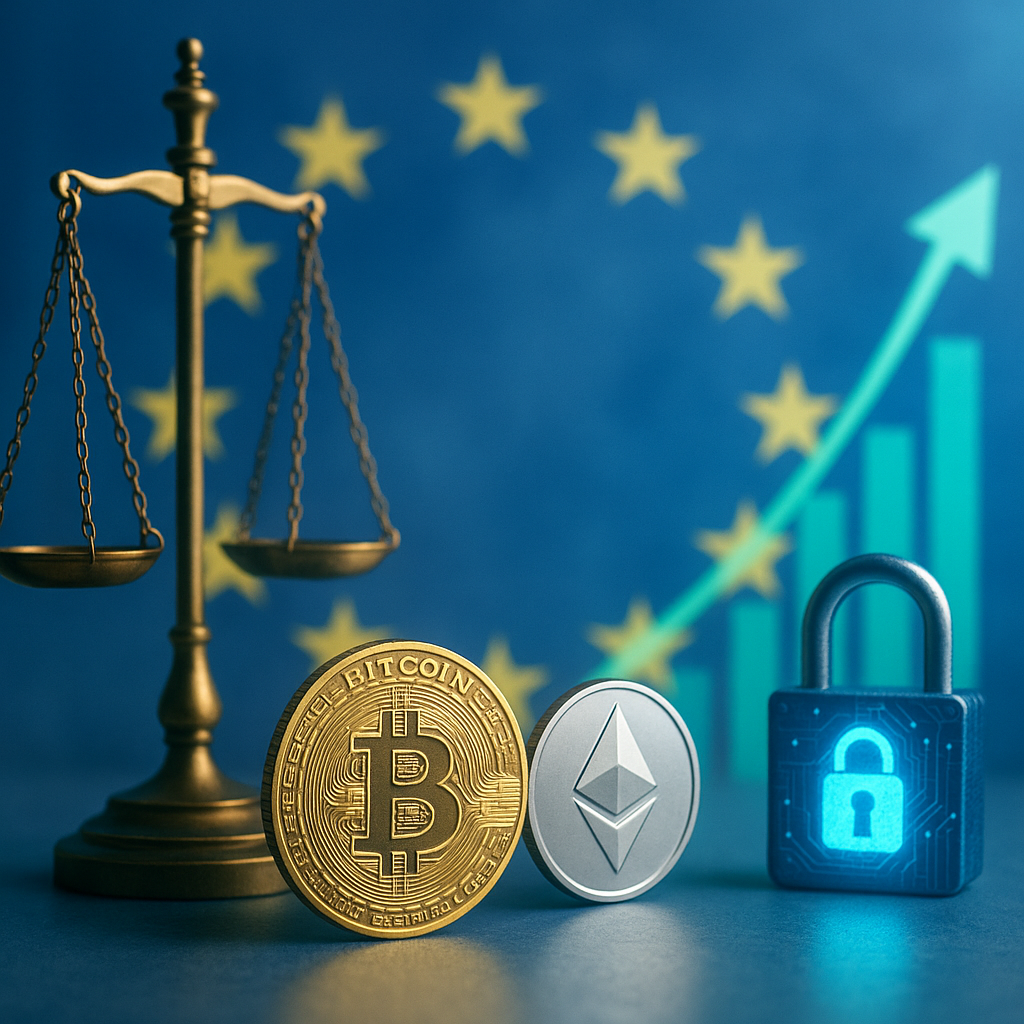I’ll say it straight: regulation was supposed to be the bogeyman, yet today most of my Telegram groups are… oddly optimistic. The European Union’s brand-new crypto rulebook just dropped, and instead of the usual “dead on arrival” memes, I’m seeing GIFs of celebratory dancing penguins. Maybe we’ve all been Stockholm-syndromed by chaos? I’m not entirely sure, but let’s unpack this together.
Here’s What Actually Happened
EU regulators finally put pen to paper on a comprehensive framework that lands in five months. Key numbers everybody’s repeating:
- 23% flat tax on crypto gains—no fancy loopholes (yet).
- Every exchange inside the bloc must snag a license and obey stricter KYC/AML rules.
- DeFi protocols need to register and keep 86% reserves. Yes, even the supposedly “code-only” ones.
- Privacy coins? Zcash and Grin are on a short leash, forced to add transaction monitoring.
- A €348 million insurance fund to bail out users if an exchange pulls a FTX face-plant.
- International players get six months to comply or peace out.
Coinbase EU and Gemini Europe issued near-identical press releases claiming this is the “clarity we’ve been waiting for.” That lines up with what I heard on Spaces last night: Brian Armstrong basically said, “Finally, we can plan product roadmaps beyond three weeks.”
Why This Matters for Your Portfolio (and Your Sanity)
I’ve noticed something ironic: the more regulators scream about consumer protection, the more retail folks YOLO in. Case in point: minutes after the press conference, BTC ripped 4.6%. Could be algo traders front-running “certainty,” or maybe just good old FOMO. Either way, green candles don’t lie.
The 23% tax hurts, sure, but compare that to some Nordic countries flirting with 35-50%. If you’ve been staking on Lido or farming on Curve, a flat cut is easier to model than the janky patchwork we had before. Think of it like switching from random dorm Wi-Fi to fiber—painful signup, smoother browsing later.
The Community Buzz (Unfiltered)
"Regulators finally showed up to the party and, surprise, they didn’t flip the table. They just want an invitation list." — @CryptoSari, DeFi dev and meme overlord
On the flip side, privacy-maxi @Ghost256 ranted that forcing Zcash to implement monitoring “kills fungibility.” I get it—optional privacy sounds like “optional freedom.” I’m torn. My gut says regulators will keep poking until all zk-coins feel like Venmo with extra steps.
Another angle I heard in a Lisbon coworking spot: smaller exchanges are doomed. Licenses aren’t cheap, legal teams even less so. Expect a consolidation wave; maybe Binance.binance will finally stop being a verb and become a monopoly in Europe? I hope not, but it feels inevitable unless DEX UX levels up fast.
Tangential Thought: Eurovision, But for Crypto Rules
Random, but I can’t stop comparing this to Eurovision. Each year, 40-something countries toss wildly different songs on stage, and somehow we crown a “European consensus.” Same vibe here. Portugal’s parliament wanted a token-friendly sandbox, Germany pushed for iron-clad KYC, France fretted about money laundering in Marseille nightclubs. The final track we got is—surprisingly—danceable.
DeFi’s 86% Reserve Rule—Wen Audit?
In my experience, DeFi founders love transparency when TVL is rising and dread it when yields flatten. Requiring an 86% reserve ratio means projects like Aave and Maker might have to publish Merkle-tree proofs in near real-time. Maybe that boosts trust, maybe it slows innovation. I’m 60-40 that auditors will become the new rock stars—Sherlock, Certik, Trail of Bits could double their fees tomorrow.
Side note: if you’re yield-hunting, keep an eye on protocols willing to geofence EU IPs. We saw that trick with NY residents; VPN usage spiked. Expect the same cat-and-mouse here.
Will This Spread to Asia-Pacific?
Circle’s Jeremy Allaire tweeted that the framework “could set a template for Singapore and Australia.” Honestly, I think he’s right. APAC regulators often crib notes from Brussels—easier than inventing policy from scratch. If that happens, anyone betting on regulatory arbitrage might find the musical chairs ending fast.
The Digital Pound Curveball
One item that made me raise an eyebrow: the EU’s central bank floated a digital Pound by 2026. Wait, wasn’t the Pound… British? Maybe we’ve entered the multiverse. My gut says they meant a euro-denominated stablecoin, but who knows. I asked three friends on WhatsApp; one sent shrug emojis, another asked if it would be backed 1:1, and the third changed the topic to Taylor Swift tickets. The lesson? Even hardcore crypto nerds zone out when central banks start naming CBDCs.
So, Is 23% the New 0%?
Here’s my hot take: predictability beats perfection. I’d rather lock in 23% and have iron-clad rules than wake up to some retroactive ban (looking at you, India 2018). With clear tax brackets, DeFi teams can run DCF models, exchanges can budget, and we retail folks can actually file taxes without summoning a black-belt accountant.
That said, I’m wary of mission creep. Today it’s 23%, tomorrow maybe 30%. If the €348 million insurance fund runs dry after one Terra-sized implosion, politicians might jack up fees faster than Solana TPS memes.
What You Can Do Right Now
- Audit your KYC footprint: figure out which wallets and exchanges are doxxed before the license gates slam shut.
- Track gas fees: if on-chain compliance tools bloom, gas could spike from extra metadata. Factor that into arbitrage bots.
- Watch privacy coin forks: some devs hint at forking Zcash pre-monitoring. Could be speculative catnip.
Let’s Keep the Conversation Rolling
I’m genuinely curious: are we underestimating the bureaucracy drag, or is this the grown-up scaffolding we always needed? Hit me up on Twitter Spaces tonight; we’ll have folks from Ledger, Bankless, and maybe even an EU regulator lurking in stealth. Bring your spicy takes.
Call to action: don’t just scroll past—email your MEP, post feedback during the public consultation window, and keep receipts. Regulation isn’t a spectator sport; it’s a DAO where apathy equals a silent ‘yes’ vote.



